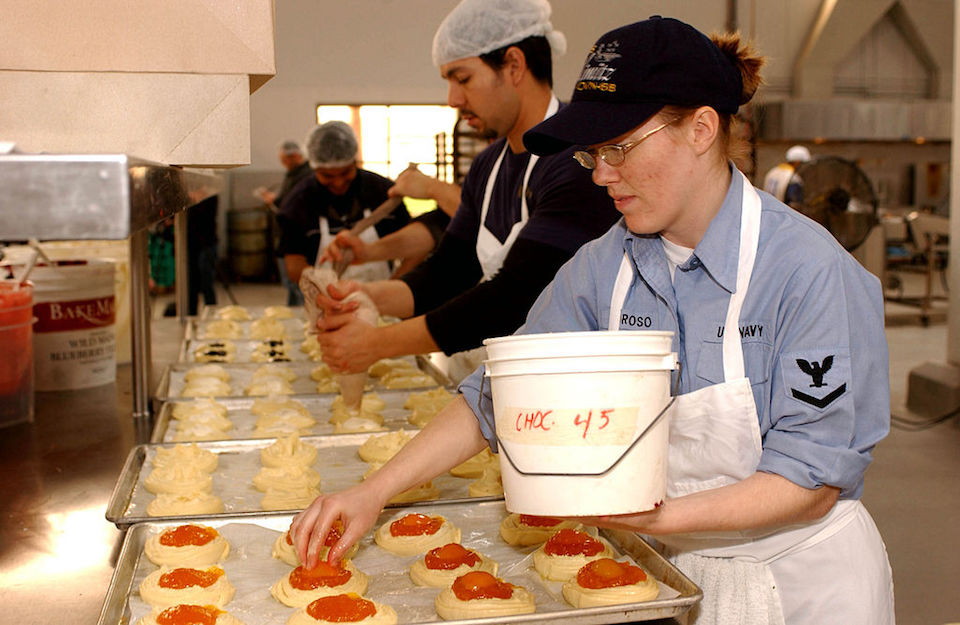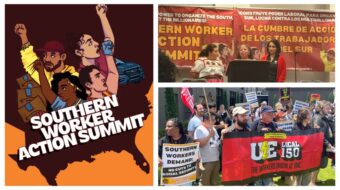
This is part two of a three-part series titled, ”Job Talk,” which investigates aspects of work and society. Part one: “What makes a quality job?” Part three: “Meritocratic thinking devalues all work.”
In her legendary tune about working the daily grind, Dolly Parton sings, “Workin’ 9 to 5/What a way to make a livin’/Barely gettin’ by/It’s all takin’ and no givin’.” Singing from the worker’s perspective, Parton gives voice to the feeling—and no doubt to the reality of the dynamics of the relationship between capital and labor– that a lot more is taken from the worker than is given back in a capitalist economy. That is the nature of how profit is produced; the worker is paid less for her labor than she produces.
The take and give Parton describes in representing life on the job, however, is a perspective that rarely finds expression in the way jobs and work are talked about in our dominant political discourse. In fact, the tendency in our culture is not to talk about work at all, but to talk about jobs—or to talk about work in terms of jobs.
And when we talk about jobs, as a culture, we tend to talk about what workers are given rather than what is taken from the worker or what the worker gives in terms of producing the goods and services that make our everyday lives possible by providing us with food, clothing, energy, shelter, transportation, education, clean offices and schools, health care, and on and on.
For example, we hear a lot about the “job-creators” in our world. Mitt Romney largely premised his 2012 presidential campaign, albeit a failed one, on his prowess as a job-creator. We didn’t hear about what the work done in such companies as Staples or Sports Authority, which he had a hand in creating, provided for the world. It didn’t matter. What mattered was that in a nation starved for jobs because of technological advancement and companies relocating factories to countries with cheaper labor, he was creating jobs so people had a way to make a living. This terminology figures the “job-creator” as a benefactor who grants the gift of a job to the worker, such that the worker is not understood as a giver, but as a recipient or taker.
Indeed, this is how we’ve come to understand what a job is. A job is simply a means for an individual to make a living, indeed to survive. The way our culture tends to talk about jobs conceptualizes them as the moral vehicle through which we justify allowing people access to resources to meet their basic needs—or to live well beyond their needs.
The “give and take” left unsaid
We don’t talk about what the worker gives us through her labor; we talk mainly about what she takes or is given. Discussion of the work any of us does to meet our collective needs as a people has almost entirely disappeared. The concept of work as the process through which we collectively and mutually serve each other and provide for each other’s needs has been subsumed into the concept of the job, which is now predominantly understood as a vehicle for individual survival.
We live in a culture in which it is more likely the construction worker wakes up in the morning and says to him or herself, “Another day, another dollar. I’m off to earn my wage so I can pay my rent and feed my family,” as opposed to, “I’m off to build housing today so my fellow citizens have places to live!” We just simply don’t cultivate this view of work as an act of giving, of making meaningful contributions upon which we all depend to meet our collective needs.
Even well-intentioned and progressive-minded thinkers adopt and promote this understanding of work. William Julius Wilson, for example, in his prominent book When Work Disappears: The World of the New Urban Poor (1996) and Jeremy Rifkin in his study The End of Work: The Decline of the Global Labor Force and the Dawn of the Post-Market Era (1995), despite that each uses the term “work,” focus mainly on jobs; that is, they each focus on and worry about “joblessness,” about people not having the means to earn a wage or salary to make a living in an economy in which technological and economic developments have eliminated jobs or relocated them. Their well-intentioned thinking is geared toward re-imagining our economy so individuals have some way of earning a living in world with less work (by which they mean “jobs”).
Again, though, work—or job—is still understood as a means to make a living, as the moral mechanism we have to justify distributing resources to individuals so they can meet their needs.
Work for the greater good
But what if we talked about work in terms of what it actually is, by which I mean the activities in which millions of people engage to produce and provide the goods and services we need to make our collective lives and society possible? What if we talked work as an act of giving, of making necessary contributions to us as individuals and a society?
For one, talking—and thinking—about work in terms of what it gives us as a society, as opposed to thinking about what the individual worker receives from the job, would presumably condition us to think about work in collective or social terms. Thinking about work in collective terms would mean identifying and prioritizing all the work required to meet our needs as society.
If we started to think about all the work necessary to meet the collective needs of nourishing, clothing, educating, housing, and providing medical care for us all as well as maintaining and building our infrastructure, among many other needs, I suspect we might become more adept at identifying resources available to us and also at recognizing the way our current economy does not optimally use our available resources to meet those needs.
For example, as a parent with children in the Chicago Public Schools who also teaches in the city, I watch class sizes balloon in ways that strain teachers’ abilities to educate their students most effectively. I also know that there are plenty of qualified teachers who could be teaching and need employment. It isn’t that we don’t have teachers who could be in Chicago’s classroom; it’s that the way our economy is organized doesn’t allow us to take full advantage of those resources to meet our educational needs.
A constraining economic system
This situation is a symptom of what Karl Marx diagnosed as a central contradiction informing capitalism (and previous modes of production), namely that the relations of production—the way we organize our economy—constrain the forces of production, all the human and natural resources we have at our disposal to produce goods and services. The Great Depression of the 1930s exposed this contradiction most glaringly, as in order to restore the “health” of the economic system, policy dictated that crops be destroyed and milk poured down sewers while meanwhile large portions of the population experienced hunger. In short, the economic system was not designed to meet human need most effectively and certainly was not allocating resources optimally to meet human need.
At this time, it is worth recalling, the Works Progress Administration initiated by the Roosevelt administration provided work to millions of the unemployed and did so by recognizing both what American workers had to offer, to give, and also what Americans needed. In addition to funding massive infrastructure projects, the WPA also funded the arts, putting artists to work in recognition of the fact that cultivating people’s artistic sensibilities and spirituality is a profound human need. The policies the Roosevelt administration enacted in many ways served to unleash, rather than constrain, the creativity of the workforce. Indeed, the Tennessee Valley Authority, created in his administration, led to the development of dams and public utilities in an area severely underdeveloped in the U.S., and it did so by harnessing otherwise underutilized expertise, creativity, and labor.
Imagining and implementing such policies, however, does seem to require a vision that understands work not simply in terms of a job one does to earn a wage but as a meaningful activity that contributes to the social project of meeting our collective needs. It requires understanding the worker as a giver and creator, as opposed to a taker or recipient.
We now, as a culture, tend to understand work as a job, which is primarily a means to distribute resources. We need to understand work as production, as a productive and creative undertaking. Doing so will not only likely begin to transform our typical degradation of work and the worker into a respect and honoring of the worker and her work, but it will help us envision and hopefully create an economy that more optimally meets our collective needs as a society.










